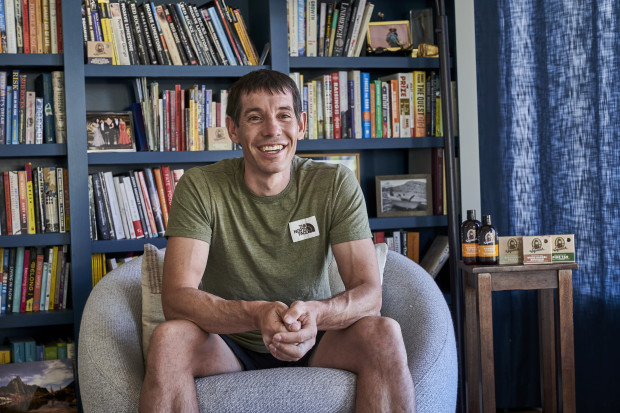No products in the cart.
Fitness Tips
Fatherhood Changed How Alex Honnold Climbs, but Not How You’d Expect

Alex Honnold trusts his hands with his life. The world’s most famous free solo climber, whose 2017 ascent up El Capitan in Yosemite National Park became the subject of the Oscar-winning documentary Free Solo, has made a career out of taking on incredible, death-defying climbs.
Last week, Honnold talked with Men’s Journal as he prepared his hands for a slightly lower-stakes task: a promotional appearance on behalf of handmade soap company Dr. Squatch where he would thumb wrestle challengers on the Venice Beach Boardwalk in Los Angeles with $250 on the line. (Honnold will launch a signature soap with Dr. Squatch later this year.)
Honnold has also embarked on another notable adventure that has nothing to do with rock walls or grappling with strangers: Parenthood. He and his wife, Sanni McCandless Honnold, welcomed a daughter, June, in early 2022. Ahead of his second Father’s Day as a dad, Honnold talked about his thumb wrestling gig and how parenthood has changed his perspective on his career.
Men’s Journal: What are your dreams and aspirations in the thumb wrestling space?
Alex Honnold: You know, it’s funny, everybody has been assuming that I’m very good at thumb wrestling. I have a sneaking suspicion that I’m really bad at it. Now my aspiration so far is to just not embarrass myself too much, just have a good time and support myself with dignity.
Editor’s Note: At the event in Venice Beach, 11 people beat him.
If you retired from rock climbing, is there anything else that could deliver the same feeling as free soloing?
It’s hard to say. I have a foundation, the Honnold Foundation, that supports solar projects around the world. I get a lot of satisfaction through the work that I do with the foundation and even satisfaction from the work events that I do, like corporate speaking and appearances and things like that. There’s always satisfaction in doing something well—particularly when it has a positive impact on the world.
But none of those things are nearly as much fun as rock climbing.
When you and your wife were expecting, you said you weren’t sure how that would affect your calculus about your climbing career. Where has it led so far?
I’d say I’m climbing as much as ever. I will say, though, that being a father has changed a little bit of how I spend my time. I hustle to and from the cliff a little faster and try to get home sooner. I’ve cut out all the extra, like, hanging out at the cliff. Fifteen years ago when I was just living by myself in a van, I’d be at the cliff all day every day, just hanging out, climbing stuff. Realistically I’m climbing a little bit less, but still certainly a healthy amount.
Has knowing you have a kid back home changed your mindset about climbing?
I haven’t done that much hardcore soloing since my daughter was born. I’ve just been focused on other goals. I’ve always blocked my schedule where I have a year or two doing quite a bit of soloing, and a year or two with more of a focus on expeditions and other sorts of climbing. It’s always come and gone in waves.
The late stages of my wife’s pregnancy and the first year of our daughter’s life is a good time to not be focused on that kind of stuff. To be present through all of this, I’m just trying to be home more. And that lends itself to physical training, to more of a schedule and a home life, training at the gym, things like that.
So I’ve set goals around sport climbing and training. It’s hard to say how much of that is a real mental shift and how much of that’s just acknowledging the reality of wanting to be home a bit more—and then choosing goals that are appropriate to keep you at home.
Related: Chris Pratt on How Being a Father Has Made Him a Better Actor
Does having a family make it impossible to climb without fear entering your mind?
Time will tell. It’s maybe possible, but it might be a challenge. I think it’s easier to free solo when you can tell yourself that your life doesn’t matter that much. You’re kind of like, “Well, I’m just doing my thing, and it’s my own choice.” And if you have any real acceptance that your life matters a lot to other people, then you are sort of like, “Well, you know, it’s sort of my responsibility to not squander that.”
On the other hand, with a lot of the hard free soloing, the whole point is to make it feel safe and relatively comfortable. To basically prepare enough that it doesn’t feel like you’re rolling the dice.
Actually, last fall I did a big soloing traverse in Red Rock, near my home in Las Vegas. It was a 32-hour soloing traverse by myself, climbing up over all the major peaks in Red Rock. I think to the average viewer, they’d be like, “Holy shit, he’s still soloing at a really high level.” But the reality is that, for me personally, that just doesn’t feel like extreme free soloing in the same way. It was kind of more akin to ultrarunning or like a giant endurance event or something. I was free soloing, but it’s a far cry from El Cap.
Sometimes when people have a kid, they get deeply scared about the kid. You know, young parents get very fearful that something will happen to their child.
We have not had that experience.
You have not had that experience as a father?
No, no. We’re just like, “She’ll be fine.” She’s a tough little bear. We call her The Bear.

